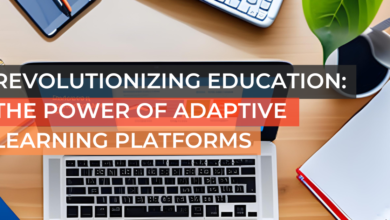Online Education Programs: Revolutionizing the Learning Landscape
Contents
- 1 Hello, Readers!
- 2 Introduction: The Dawn of Digital Education
- 3 Strengths of Online Education Programs:
- 4 1. Flexibility and Convenience
- 5 2. Accessibility and Inclusivity
- 6 3. Global Reach and Diversity
- 7 Weaknesses of Online Education Programs:
- 8 1. Lack of Social Interaction
- 9 2. Technological Challenges
- 10 3. Self-Discipline and Motivation
- 11 FAQs on Online Education Programs:
- 11.1 1. What are the different types of online education programs?
- 11.2 2. How do I apply for an online education program?
- 11.3 3. Are online education programs accredited?
- 11.4 4. What are the costs of online education programs?
- 11.5 5. Are online education programs as good as traditional on-campus programs?
- 11.6 6. What are the career prospects for graduates of online education programs?
- 11.7 7. Are online education programs suitable for everyone?
Hello, Readers!
As the world swiftly transitions into a digital realm, education has not been left untouched. Online education programs have emerged as beacons of flexibility and accessibility, offering unrivaled opportunities for individuals eager to pursue their academic aspirations. These innovative platforms are shattering conventional barriers, empowering students to learn at their own pace, place, and time.
Introduction: The Dawn of Digital Education
The advent of online education programs marks a transformative chapter in the history of education. Propelled by advancements in technology, these programs have unlocked unprecedented access to knowledge, enabling individuals from diverse backgrounds to engage in higher education without the constraints of physical proximity. Online education has become a democratizing force, opening doors to learning for those who may have previously faced insurmountable obstacles.
The flexibility inherent in online education programs has revolutionized the pace and timeframe for educational attainment. Students can now tailor their learning journeys to align with their unique schedules and commitments, fostering a harmonious balance between academic pursuits and personal responsibilities. The asynchronous nature of online courses allows learners to delve into course materials at their preferred times, accommodating the needs of both working professionals and those with family obligations.
The geographical reach of online education programs transcends borders, creating a global classroom where students from across the globe can connect and collaborate. This interconnectedness fosters a rich tapestry of perspectives, broadening horizons and promoting cultural exchange. Online education has become a catalyst for international cooperation, nurturing mutual understanding and bridging gaps between nations.
Strengths of Online Education Programs:
1. Flexibility and Convenience
The paramount strength of online education programs lies in their unparalleled flexibility. Students can access course materials and participate in discussions from anywhere with an internet connection. This flexibility is particularly advantageous for individuals with busy schedules or those who reside in remote areas where traditional face-to-face education may be inaccessible.
Online learning platforms cater to the diverse needs of students, allowing them to set their own learning pace and schedule. Whether they prefer to study during the day, late at night, or on weekends, students can tailor their learning experience to align with their personal commitments and preferences.
2. Accessibility and Inclusivity
Online education programs have shattered geographical and socioeconomic barriers that have historically hindered access to higher education. By eliminating the need for physical presence on campus, online learning empowers individuals from all walks of life to pursue their academic aspirations.
For students who may be financially constrained, online education programs offer a cost-effective alternative to traditional on-campus programs. The absence of commuting expenses, parking fees, and other ancillary costs associated with on-campus education translates into significant savings for students.
3. Global Reach and Diversity
Online education programs have fostered a global classroom, where students from across the world can connect, collaborate, and exchange ideas. This interconnectedness transcends cultural and linguistic boundaries, fostering mutual understanding and appreciation for diverse perspectives.
International students who may not have the opportunity to study abroad can now access world-renowned institutions through online programs. This cross-pollination of knowledge and experiences enriches the learning process, broadening students’ horizons and preparing them for a globalized workforce.
Weaknesses of Online Education Programs:
1. Lack of Social Interaction
While online education programs offer unparalleled flexibility, they may also present challenges in fostering meaningful social interactions among students. The absence of physical face-to-face encounters can hinder the development of interpersonal relationships and the spontaneous exchange of ideas that often occur in traditional classroom settings.
For students who crave social engagement and peer support, online learning environments may feel isolating. The lack of non-verbal cues and the inability to engage in spontaneous discussions can limit the richness of interactions and impact the overall learning experience.
2. Technological Challenges
The effectiveness of online education programs hinges on reliable access to stable internet connectivity. Students in areas with poor internet infrastructure or limited access to technology may face challenges in participating fully in online courses.
Additionally, technical difficulties, such as software glitches or platform outages, can disrupt the learning process. Students may experience frustration and delays in completing assignments or participating in online discussions if they encounter technical issues.
3. Self-Discipline and Motivation
Online education programs require a high level of self-discipline and motivation. Without the structure and external accountability of a traditional classroom environment, students may struggle to stay on track and complete coursework deadlines.
For individuals who thrive on face-to-face interactions with instructors and peers, the lack of regular in-person contact may erode motivation and make it challenging to maintain engagement with the learning materials.
| Feature | Benefits |
|---|---|
| Flexibility and Convenience | Learn at your own pace, from anywhere with an internet connection |
| Accessibility and Inclusivity | Eliminate geographical and socioeconomic barriers to education |
| Global Reach and Diversity | Connect with students and experts from around the world |
| Lack of Social Interaction | Limited opportunities for face-to-face interactions |
| Technological Challenges | Reliance on stable internet connectivity and software |
| Self-Discipline and Motivation | Requires high levels of self-discipline and intrinsic motivation |
FAQs on Online Education Programs:
1. What are the different types of online education programs?
Online education programs encompass a wide range of offerings, including fully online programs, blended learning programs, and distance learning programs. Fully online programs are conducted entirely online, while blended learning programs combine online and face-to-face instruction. Distance learning programs offer flexible learning options, often with minimal or no in-person interactions.
2. How do I apply for an online education program?
The application process for online education programs varies across institutions. Generally, you will need to submit an application form, official transcripts, letters of recommendation, and a statement of purpose. Some programs may also require you to submit additional materials, such as a portfolio or test scores.
3. Are online education programs accredited?
Accreditation is a critical factor to consider when choosing an online education program. Accreditation ensures that the program meets established quality standards and is recognized by employers and other educational institutions. Look for programs that are accredited by reputable organizations, such as the Distance Education Accrediting Commission (DEAC).
4. What are the costs of online education programs?
The costs of online education programs vary depending on the institution, program level, and duration. Some programs charge flat tuition fees, while others charge per credit hour. It is important to research the costs carefully and factor in additional expenses, such as technology and materials.
5. Are online education programs as good as traditional on-campus programs?
The quality of online education programs can vary widely. Some online programs offer a comparable learning experience to traditional on-campus programs, while others may not meet the same standards. It is important to research the program thoroughly and consider factors such as faculty credentials, course content, and student support services.
6. What are the career prospects for graduates of online education programs?
Graduates of accredited online education programs are eligible for the same career opportunities as graduates of traditional on-campus programs. Employers recognize the value of online education, as long as the program is accredited and the student has demonstrated the necessary skills and knowledge.
7. Are online education programs suitable for everyone?
Online education









